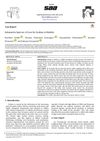1 citations,
November 2021 in “Translational pediatrics” Glucocorticoids for progressive muscular dystrophy in children don't improve muscle strength or function but do increase certain side effects.
August 2022 in “International Journal of Health Sciences (IJHS)” The combined treatment significantly improved hair growth and thickness compared to the control group.
 September 2023 in “Journal of The American Academy of Dermatology”
September 2023 in “Journal of The American Academy of Dermatology” Dutasteride is safe and effective long-term for male hair loss.
[object Object]  January 2022 in “Gastro Hep advances”
January 2022 in “Gastro Hep advances” Prednisone treatment helped a woman with Cronkhite-Canada syndrome recover from hair loss and digestive issues.
 1 citations,
September 2023 in “Life science alliance”
1 citations,
September 2023 in “Life science alliance” Vitamin D Receptor is crucial for hair follicle shrinkage and cell death, affecting hair growth.
![Synthesis and In Vitro Study of 17β-[N-Ureylene-N,N′-Disubstituted]-4-Methyl-4-Aza-5α-Androstan-3-Ones as Selective Inhibitors of Type I 5α-Reductase](/images/research/d19df8a7-8de6-4430-8a0d-4ffa1f502985/small/15608.jpg) 5 citations,
February 1997 in “Bioorganic & Medicinal Chemistry”
5 citations,
February 1997 in “Bioorganic & Medicinal Chemistry” New compounds were made that effectively block a specific enzyme related to androgen conditions.
 January 2015 in “VetPharma”
January 2015 in “VetPharma” Alopecia X causes hair loss in young plush-coated dogs and can be treated with various therapies, but hair may regrow and then fall out again.
 28 citations,
December 2012 in “The American Journal of Cosmetic Surgery”
28 citations,
December 2012 in “The American Journal of Cosmetic Surgery” Proteins from stem cells improved hair growth in patients with hair loss.
 1 citations,
November 2015 in “Journal of Evolution of Medical and Dental Sciences”
1 citations,
November 2015 in “Journal of Evolution of Medical and Dental Sciences” Certain skin symptoms can help detect and manage systemic lupus.
 October 2017 in “The Indian Journal of Animal Sciences”
October 2017 in “The Indian Journal of Animal Sciences” The prolactin gene polymorphism doesn't affect cashmere quality in these goats.
 13 citations,
October 2011 in “Clinical and Experimental Dermatology”
13 citations,
October 2011 in “Clinical and Experimental Dermatology” Laser hair-comb therapy doesn't improve male-pattern hair loss.
 March 2024 in “Romanian Medical Journal”
March 2024 in “Romanian Medical Journal” Inositol shows promise in treating PCOS and other health issues, but more research is needed.
 November 2022 in “Journal of Investigative Dermatology”
November 2022 in “Journal of Investigative Dermatology” Short-term treatment with ROCKi increases skin cell growth without changing stem cell features.
 July 2021 in “Rossiiskii Zhurnal Kozhnykh i Venericheskikh Boleznei”
July 2021 in “Rossiiskii Zhurnal Kozhnykh i Venericheskikh Boleznei” Low vitamin D levels are linked to more skin problems.
 June 2023 in “Small animal advances”
June 2023 in “Small animal advances” Selamectin spot-on effectively treats scabies in rabbits.
 April 2018 in “The journal of investigative dermatology/Journal of investigative dermatology”
April 2018 in “The journal of investigative dermatology/Journal of investigative dermatology” Double-stranded RNA helps regenerate hair follicles by increasing retinoic acid production and signaling.
 January 2023 in “Sovremennye problemy nauki i obrazovaniâ”
January 2023 in “Sovremennye problemy nauki i obrazovaniâ” Miliacin may help prevent hair loss and improve hair growth in mice with a condition similar to human baldness.
 120 citations,
June 2008 in “American Journal of Epidemiology”
120 citations,
June 2008 in “American Journal of Epidemiology” A simple screening method found that 6.3% of women in a semiurban area in Sri Lanka have polycystic ovary syndrome, with most showing menstrual irregularities.
 5 citations,
July 2003 in “Pediatric Critical Care Medicine”
5 citations,
July 2003 in “Pediatric Critical Care Medicine” Most patients experience temporary hair loss after ECMO, but it usually grows back within 6 months without treatment.
 1 citations,
September 2018 in “Journal of the American Academy of Dermatology”
1 citations,
September 2018 in “Journal of the American Academy of Dermatology” Children with autoimmune hair loss have similar vitamin D levels to healthy kids, suggesting no extra screening is needed.
 February 2011 in “Annales de dermatologie et de vénéréologie”
February 2011 in “Annales de dermatologie et de vénéréologie” Tofacitinib shows promise for treating severe alopecia areata with good safety and effectiveness.
 23 citations,
December 1995 in “Archives of Dermatology”
23 citations,
December 1995 in “Archives of Dermatology” Combination therapy improves hair growth in advanced hair loss.
[object Object]  14 citations,
January 2008 in “Dermatology”
14 citations,
January 2008 in “Dermatology” Vitamin D made by the skin plays a role in immune defense and skin health, and more research is needed to understand its full effects.
3 citations,
April 2023 in “Dermatologica Sinica” PRP treatment may help with alopecia areata, especially in newer cases.
 19 citations,
December 2008 in “Medical Journal of Australia”
19 citations,
December 2008 in “Medical Journal of Australia” Baldness does not affect vitamin D levels in men.
 17 citations,
February 2013 in “PLOS ONE”
17 citations,
February 2013 in “PLOS ONE” 6-Gingerol, found in ginger, may slow down hair growth and could be used for hair removal.

Adequate vitamin D might lower, and high hair chromium might increase DNA damage in obese women.
 1 citations,
June 2021 in “International Journal of Dermatology”
1 citations,
June 2021 in “International Journal of Dermatology” People with alopecia areata had lower vitamin D levels, but these levels didn't relate to many aspects of the condition.
 December 2024 in “International Journal of Health Sciences and Research”
December 2024 in “International Journal of Health Sciences and Research” Vitamin D is crucial for health, and deficiency can cause hair loss and other health issues.
 40 citations,
April 2013 in “Dermato-endocrinology”
40 citations,
April 2013 in “Dermato-endocrinology” People with chronic Alopecia Areata often have lower vitamin D levels.



![Synthesis and In Vitro Study of 17β-[N-Ureylene-N,N′-Disubstituted]-4-Methyl-4-Aza-5α-Androstan-3-Ones as Selective Inhibitors of Type I 5α-Reductase](/images/research/d19df8a7-8de6-4430-8a0d-4ffa1f502985/small/15608.jpg)






















